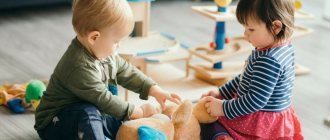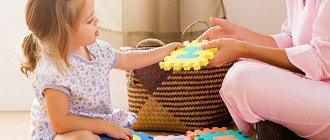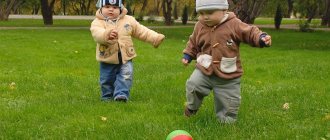Raising children is the most important task of a modern family. The development of the child’s personality as a whole will depend on what style of family education prevails in the family.
The style of family education is the way parents relate to the child, their use of certain techniques and methods of influence on the child, expressed in a peculiar manner of verbal address and interaction with the child. Any disharmony in the family leads to adverse consequences in the development of the child’s personality and problems in his behavior.
Authoritarian style of family education
With an authoritarian parenting style, parents suppress the child’s initiative, strictly guide and control his actions and actions. When raising children, they use physical punishment for the slightest offenses, coercion, shouting, prohibitions. Children are deprived of parental love, affection, care, and sympathy. Such parents only care that the child grows up obedient and efficient. But children grow up either insecure, timid, neurotic, unable to stand up for themselves, or, conversely, aggressive, authoritarian, and conflict-ridden. Such children have difficulty adapting to society and the world around them.
Parents strictly monitor the completion of homework by younger schoolchildren, to the point of standing nearby and putting pressure on the child in an attempt to get him to act independently. For the purpose of self-defense, children use a variety of tricks, such as crying, to show their helplessness. As a result of such measures, children lose the desire to learn, they have difficulty concentrating during teacher explanations or when preparing lessons.
With their parents, such children may seem calm and dutiful, but as soon as the threat of punishment disappears, the child’s behavior becomes uncontrollable.
The influence of an authoritarian parenting style on the behavior of adolescents
As the child grows older, he becomes increasingly intolerant of the demands of authoritarian parents. In adolescence, frequent conflicts can lead to disastrous outcomes. It is with an authoritarian style of family education that adolescents will generate conflicts, treating others with hostility. Parents always make decisions for the child themselves, thereby suppressing the child’s initiative, depriving him of the opportunity to learn to take responsibility for his actions.
Active and strong teenagers will begin to rebel, resist, become more aggressive, and may run away from home. Timid and insecure teenagers with low self-esteem, on the contrary, will get used to obeying their parents in everything, making no attempt to solve their own problems on their own, and will always rely on their parents in everything.
Educational potential of the family
The family is the link between the child and society and other social institutions. Moral standards, rules, morality are laid down in the family, moreover, in the first 5 years of a child’s life. Such universal human values as honesty, justice, kindness, loyalty, generosity, selflessness, etc. are formed.
Otherwise, selfish behavior and destructive aspirations (aggression, hostility, anger, hatred) may develop. Ultimately this will probably lead to immoral behavior. Then the person will pose a danger to society and himself. Therefore, the value of family education is limitless for society.
As part of family education, the following is carried out:
- patriotic;
- ethnocultural;
- aesthetic;
- moral;
- physical;
- sex and gender education.
The family is the first pedagogical system into which a child finds himself. Moreover, he is constantly in this system. This means that every parent’s action, word, gesture has educational significance. Family education is carried out constantly, every day, within the framework of the shared life of children and parents.
This is the uniqueness of family education: its continuity and duration, its more emotional nature and lasting influence.
In the modern world there is a decline in the educational potential of the family. There are several reasons for this:
- lack of time for upbringing due to excessive workload of parents;
- lack of time spent together and communication between children and parents;
- the growing value gap between generations, and as a consequence - their alienation;
- increasing the influence of external unfavorable factors on the microclimate in the family.
As a result, the relationship between parents and children suffers quantitatively and qualitatively. Firstly, there is a lack of time together. Secondly, there is a lack of understanding and trust in the relationship.
The personal characteristics of the parents also have a significant impact on the family. Negatively affects:
- instability, inconsistency of personality;
- inadequate self-esteem;
- diffidence;
- egocentrism;
- accentuated character traits;
- excessively expressed nature of processing of feelings and experiences;
- inflexibility of thinking.
The attitude of the parents towards the child will determine the attitude of the child towards himself later.
Liberal-permissive style of family education (hypocustody)
With a liberal-permissive style, communication with a child is based on the principle of permissiveness and low discipline. To assert himself, the child uses whims, demands “Give me!”, “Me!”, “I want!”, and is demonstratively offended. The child does not understand the words “Must!”, “Impossible”, and does not follow the instructions and demands of adults. Parents with a liberal-permissive style of communication with a child are characterized by an inability or unwillingness to lead and guide the child.
Liberal parents are caring, attentive, and have close relationships with their children. They give the child the opportunity to express himself, show his abilities, discover his creativity and individuality. Parents sincerely believe that in this way they will be taught to distinguish between what is right and wrong. It is difficult for liberal parents to set the boundaries of permitted, acceptable behavior for their children. They often encourage their child's overly relaxed and inappropriate behavior.
How will a child grow up with a permissive style of family education?
As a result, the child grows up to be a selfish, conflicted person who is constantly dissatisfied with the people around him, which does not give him the opportunity to enter into normal social relationships and emotional strong connections with people. At school, such a child may experience frequent conflicts due to the fact that he is not accustomed to giving in, obeying elders, or following laws and rules.
A child raised in an environment of permissiveness is more susceptible to psychological problems, phobias, and depression. Such a child has not learned to control himself and his behavior will have little chance of developing self-esteem. In the future, a child raised by liberal parents will be unable to face life's challenges and will have difficulty interacting socially. Which in turn will lead to the lack of adequate self-esteem and self-esteem. He will conflict with everyone who does not indulge his desires.
Primary socialization of the child as the main function of the family
In psychological terms, the family determines the primary socialization of the child. Kindergarten, school, university – secondary socialization. Naturally, the primary is more important. It lays down the basic ways an individual reacts to problems, behavior patterns, and attitudes. What is meant by primary socialization:
- mastering language and emotional structure;
- mastering the basic value norms and meaningful ideas of society.
The purpose of primary socialization in the family is to form in the child social responsibility and the ability to subordinate the individual to the general.
A child's socialization goes through imitation and identification.
- Through imitation, the child learns elements of culture, skills, traditions, and rituals. But for imitation, that is, imitation, there must be an example. And these are the parents.
- Identification is the acceptance of norms and beliefs as one’s own (or non-acceptance). At this stage, all is not lost. And even if the family is dysfunctional, but the child is influenced more favorably from the outside, he may not accept the example of his parents. A clear example: in a family of alcoholics, children usually have two scenarios: to repeat the image of their parents or, on the contrary, to categorically not accept alcohol. There is very rarely a middle ground.
When family members fail to fulfill their responsibilities and rights, disharmony occurs in the family. Due to disharmony – dysfunction. When the family and other institutions of public education are dysfunctional, maladaptation of the child and social maladjustment arise as a mass phenomenon. This in turn leads to desocialization, which is what is observed in modern society.
Overprotective style of family education
With an overprotective parenting style, parents deprive the child of independence in physical, mental, and social development. They are constantly next to him, solve his problems for him, live in his place. They overly care and patronize him, fearing and worrying about his health. Even when the child becomes an adult, parents continue to take excessive care of him, constantly worrying about him, about his health and well-being.
Overprotection suppresses the initiative, will and freedom of the child, his energy and cognitive activity, deprives him of independence, fosters obedience, lack of will, and helplessness. With an overprotective parenting style, parents unconsciously inhibit the development of various skills and abilities in the child, the development of perseverance in achieving goals, and hard work.
How will a child grow up with an overprotective style of family education?
The child grows up helpless, infantile, unsure of himself, neurotic, anxious, and tearful. Subsequently, he has difficulties in socialization.
Children grow up obedient, but at the same time unsure of themselves, their strengths and capabilities, they will always be afraid of doing something wrong, making a mistake.
Some children in adolescence will strive to escape from the excessive control and guardianship of their parents, showing aggression, becoming disobedient and willful.
Overprotection, control, restrictions and prohibitions will develop the child’s ability to be cunning, deceive and secretive. Teenagers will use lies as a means of self-defense against parents who constantly try to control their personal life, which will ultimately lead to alienation from them.
The consequences of an overprotective style of family education are the formation of dependence on others, as well as negative influence from other people. It is overprotection that is to blame for the fact that children grow up to be “mama’s boys.”
Good manners
Good manners are the result of upbringing. It manifests itself externally (compliance with norms and rules of behavior) and internally (moral attitudes and motives, moral choice). There are two levels of child upbringing.
High level
A large stock of moral knowledge (attitude towards oneself, work, another person, society). Coherence of knowledge with beliefs and motives. Unity of beliefs and actions. A single personal worldview. Developed willpower, goal-setting ability. Bringing things to completion despite difficulties. A person is self-confident, positive emotions and feelings prevail.
Low level
Ambiguous ideas about what is moral and what is immoral. Personal motives diverge from social norms of behavior. Moral knowledge and beliefs are inconsistent. Goal setting is “lame”: goals are unrealistic or situational, and are easily destroyed at the slightest difficulty. The person is anxious and unsure of himself, negative emotions and feelings predominate.
Alienated family parenting style
With an alienated style of family upbringing, relationships imply a deep indifference of parents to the child’s personality. Parents “don’t notice” the child and are not interested in his development and spiritual inner world. By actively avoiding communication with him, they keep him at a distance from themselves. Children are left to their own devices.
An alienated parenting style is observed more often in dysfunctional families where one or both parents abuse alcohol or drugs.
How will a child grow up with an alienated style of family education?
Such an indifferent attitude of parents makes the child lonely and deeply unhappy, unsure of himself. He loses the desire to communicate, and may develop aggressiveness towards people. Teenagers often get into trouble with the law.
Recommendations
- Children need warmth. Don’t be afraid to show warm feelings, talk more often, be interested in the opinion of your interlocutor.
- Distribute family responsibilities. Junior members should have their own assignments.
- It is necessary that the instructions you give look like a proposal, and not a dry order. Any communication must be confidential and emotional.
- The system of prohibitions and punishments is discussed and understood in advance. Any censure is not directed at the individual. A child is never bad. He did wrong, the adult explains why it is wrong.
- A teenager has the right to choose friends and clothes; parents do not interfere in telephone conversations and the choice of music to listen to.
- Forget about old sins, always talk about your current state, explain why you are upset, do not put pressure, do not physically humiliate.
- Love your child, do not hesitate to show this feeling, be sincere, try to take initiative.
Chaotic family parenting style
Some psychologists identify a chaotic style of family education, characterized by the absence of a single consistent approach to raising a child: there are no specific, definite, clear requirements for the child.
A chaotic style arises due to disagreements between parents in the choice of means and methods of education. Conflicts in the family are becoming more and more frequent, parents constantly sort things out among themselves and often in the presence of the child, which leads to neurotic reactions in the child.
Unpredictable actions and reactions of parents deprive the child of a sense of stability, provoke increased uncertainty, impulsiveness, anxiety, aggressiveness, uncontrollability, and social maladjustment.
How will a child grow up with a chaotic parenting style?
The child needs stability and the presence of clear, specific guidelines in assessments and behavior. Parents who use different parenting and communication styles deprive the child of such stability and form an anxious, insecure, impulsive, and in some cases aggressive, uncontrollable personality.
With a chaotic parenting style, the child will not develop self-control and a sense of responsibility for himself and other people. The child will be characterized by immaturity of judgment.
Why you can't assault
- The child is weaker. The child's self-esteem suffers. Even if he begins to obey, it will not add to his happiness.
- The little person begins to be afraid of everything and stops trusting adults. Who else to trust if not your parents?
- Those raised this way easily fall into bad company. Not finding love from the family, they feel more comfortable with the “kind” guys who share a cigarette and then a “wheel.”
- Self-doubt leads to subsequent overcompensation. Trying to achieve something, someone who was beaten in childhood will go “over the corpses.”
Democratic style of family education
With a democratic style of education, parents encourage any initiative of the child, independence, help him, take into account his needs and requirements. They express their love and goodwill to the child, and play with him on topics that interest him. Parents allow children to take part in discussions of family problems and take their opinions into account when making decisions. And also, in turn, they demand meaningful behavior from children, they show firmness and consistency in maintaining discipline.
The child is in an active position, which gives him the experience of self-government and increases confidence in himself and his abilities. Children in such families listen to the advice of their parents, know the word “should”, know how to discipline themselves and build relationships with classmates.
Also, the democratic style of education is characterized by the presence of mutual understanding between parents and children, the manifestation of warm feelings between them, frequent communication and moderate discipline. Parents are attentive to their child, emotionally support him, and create an atmosphere of love and care in the family.
Parents encourage children's independence and personal responsibility in an age-appropriate manner. Parents set rules and standards, boundaries of acceptable behavior and require their child to comply with them.
Mutual understanding between parents and children is achieved through persuasion, discussion, compromise, and arguments. Parents always listen to their child and give the child the opportunity to take responsibility for their actions and actions.
How will a child grow up with a democratic style of family education?
Children grow up as active, inquisitive, independent, full-fledged individuals with a developed sense of self-esteem and responsibility for themselves and those close to them. Children do well in school, are less susceptible to negative peer influence, and are able to get along well and build relationships with people.
The child grows up responsible, independent, competent, self-confident with adequate self-esteem, able to control his desires and, as a rule, achieves great success in life. Children know that their parents will always be able to listen and help.
Correct, responsible social behavior is formed in a child when parents show justice, care, firmness and discipline.
The democratic style of parenting, according to many psychologists, is the most effective style of family education. Whichever of the above styles you choose, when raising, take into account the type of temperament of the child.
pros
Naturally, they will listen to you and do what you demand without unnecessary objections. Such a parent is not ashamed of his child when he is in society. After all, unlike their peers, his daughter or son will not allow themselves to run, jump and make noise. They will win medals and certificates, sacrificing their interests to make their parents happy.
Obedience also affects family finances. They will not beg for any toys, amusement parks, and so on.
Another plus is that you don’t have to work on yourself, in terms of overcoming personal limitations, developing certain qualities, admitting mistakes, etc. Why spend a lot of time trying to find a common language with a child, trying to understand him, if you can just shout and order from your adult position?
I hope you understand that these are just exaggerated jokes. The fact is that I could not find any really worthwhile advantages of authoritarianism. When education is complex, that is, where necessary, freedom is given, and when necessary, power is demonstrated - then authoritarianism is truly useful.
Sometimes it is important to remind who is in charge in the family and whose opinion is worth listening to. But if only the above methods are involved, when this style of parenting goes off scale, there are no advantages, at least without causing psychological trauma.
Family education styles and their characteristics according to the type of “maternal” attitude towards the child:
Mother's attitude towards her teenage son as a “replacement” husband
The mother demands constant attention and care from the teenager. The mother constantly interferes in her son’s personal life, limits contacts with peers and peers, and strives to be aware of his personal and intimate life. You can often hear dissatisfaction from a mother about the fact that her son seeks to distance himself from her and avoids communication. In a less crude form, the teenager is assigned the role of “head of the family.”
Hyperprotection and symbiosis
The mother has a strong desire to hold on, to tie the child to herself, to limit his independence out of fear of a possible misfortune with the child in the future. In psychology, such an attitude is called the “smart Elsa” complex. The mother downplays the child's real capabilities and abilities, which leads to restrictions and maximum control, the desire to do everything for the child in order to protect him from imaginary misfortunes in the future.
Educational control through deprivation of love
This style of parenting is characterized by demonstrating to a child or teenager the attitude “That he is not needed like this, his mother does not love him like this” in the event of any undesirable behavior, disobedience, or insufficient, in the parents’ opinion, school performance, skills and achievements.
Parents, as a rule, do not directly express their dissatisfaction, do not speak it out, or try to explain to the child why he did something wrong. Parents simply stop talking to the child, ignore him, and talk about him in the third person.
In hyperthymic adolescents, such an attitude of parents towards him gives rise to a powerless feeling of anger and rage, outbursts of aggression. A teenager with such behavior wants to prove his existence, to infiltrate the family “We”. The parent, out of fear of aggression, goes to peace, or through retaliatory aggression (slapping, beating) tries to overcome the wall of alienation he has created.
Hyperthymia is a persistent high mood, cheerfulness, accompanied by personal and professional activity, increased socialization.
In sensitive children or adolescents, such an attitude from parents creates a deep feeling of loneliness and uselessness. In order to regain the love of his parents, the child is forced to limit his own individuality, sacrifice his self-esteem, depriving himself of his own “I”. In this way, parents achieve obedience by devaluing the child’s personality.
Educational control by inducing feelings of guilt
A child who violates a ban is labeled by his parents as “ungrateful”, “causing his beloved mother so much grief”, “betraying parental love”, etc. In the future, the teenager, under the constant fear of being guilty of the problems of his parents, is forced to fetter his own independence and initiative.
Styles of family education - books 1. Azarov Yu.P. The art of education. M., 1985. 2. Dobrynina O. A. The problem of creating a favorable socio-psychological climate for the family (on the example of metallurgical workers): Diss. ...cand. psychol. Sci. Novokuznetsk, 1992. 3. Druzhinin V. N. Family psychology. – M., 1996. – 158 p. 4. Kulikova T. A. Family pedagogy and home education: A textbook for students. medium and higher ped. textbook establishments. - M: Publishing House, 2007 5. Shneider L. B. Family psychology: a textbook for universities / L. B. Shneider. — Ed. 3rd. M.: Academic Prospekt; Ekaterinburg: Business book, 2007.
Characteristic
The authoritarian style is characterized, as mentioned above, by rigidity. It includes such educational tools as coercion, orders, threats, criticism and other manipulations that can cause feelings of fear, shame and necessarily guilt.
The ultimate goal is obedience. So that he understands how wrong and imperfect he is, unlike his parent.
Accordingly, to feel shame and guilt for this, which will stimulate him to meet the expectations of the people who “love” him. Who believe that he is simply devoid of will and the ability to make decisions. Unable to manage their activities and make choices.
Violence is not only physical, sometimes the most complex, causing deep psychological trauma, is directly moral. To cripple another person, you don’t have to beat him, you can simply deprive him of his will and constantly criticize him.
Become a better parent!
If you feel like you are not the type of parent you want to be and your relationship with your child is going in the wrong direction, there is always a chance for positive change. You can talk to one of our psychologists to help you understand why you act the way you do, what you're doing wrong, and how you can help yourself become the parent you want to be. You, as an adult, are certainly responsible for the future of your child, and for what kind of adult he will become. Remember, you can improve your relationship at any age; it’s never too late to do so. Children change very quickly and thrive in loving and caring relationships.
Author: Editorial staff of the Help-Point.net portal
Start working with a psychologist right now
Start a consultation
Tags: children psychologist consultation parents toxic childhood trauma psychologist online
Share
Comments
- Comments
Loading comments...
Previous article
Psychotherapist for adults
Next article
Completion
And that’s all for today, dear readers! Finally, I recommend reading the article about authoritarian upbringing, what it can contribute to development, and also what, on the contrary, it can hinder.
Still, sticking to just one style is almost impossible. After all, there are times when you need to show firmness and rigidity in your position. And there are times when you should loosen control as much as possible and give freedom of action.
So it is important to know about each type of parenting so that you can apply it when it is most relevant and needed.
Take care of yourself and be happy! See you again! The material was prepared by psychologist, Gestalt therapist, Alina Zhuravina
4.Indifferent
The most catastrophic type of upbringing is lack of demands + ignoring needs
Essentially, these are single children. Parents don’t care about them at all, and they avoid raising them in every possible way. Often these are depressed mothers, or parents who didn’t really want children and are not interested in caring for them. Children irritate them, so they are not interested in their needs, feelings and desires, sometimes they punish, but not with the goal of showing right and wrong behavior, setting boundaries, but because of their own momentary emotions.











